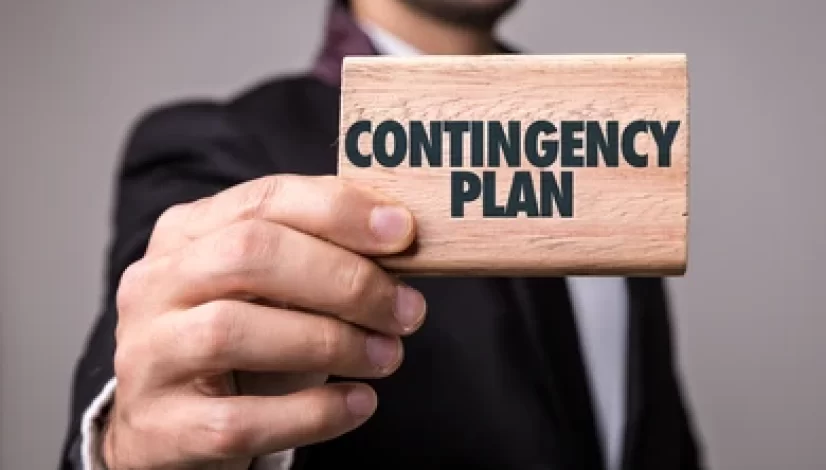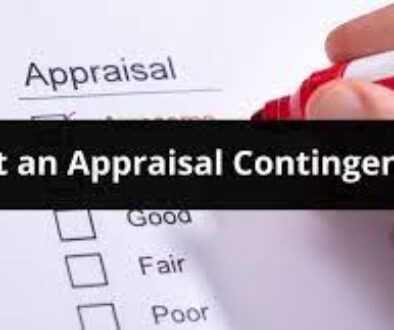Contingency
It likely doesn’t come as a surprise that there are no certainties in any real estate transaction. Each one has an element of uniqueness regarding how the process will play out because every seller, buyer, situation and house is different.
As a buyer, you want to protect yourself against the unexpected. That’s why most home sales are made “contingent” on what happens next, which allows buyers to back out if something goes wrong as the sale moves through the process on the way to completion. In this article, we’ll go over the details of what “contingent” means and how it impacts the home buying process.
What Does Contingent Mean In Real Estate?
Contingent means “depending on certain circumstances.” In real estate, when a house is listed as contingent, it means that an offer has been made and accepted, but before the deal is complete, some additional criteria must be met.
For instance, if a seller offers a certain price and you, as the buyer, say the price is fine (provided the home inspection comes back clean), you have made a contingent real estate contract. In this case, the sale of the house depends on the inspection not having problems defined in the contract.
How Does A Contingent Offer Work?
With a contingent offer, you have stated that a certain condition must be met before the sale moves forward. If it doesn’t, the contract is void, and the seller can move on to a backup offer received while the sale was contingent. Contingencies are often used to protect the buyer from problematic home listings or unforeseen issues within the real estate transaction.
Keep in mind that making a contingent offer on a property is easier if you’ve already found a lender you want to work with. This can ease sellers’ fears of the sale falling through due to lack of financing or the buyer not qualifying for a mortgage. If possible, start the approval process as soon as you’re ready to buy a home.This way, you’ll increase your chances of having the seller accept your offer, contingencies and all.
Contingent Offer Example
Returning to our example above, let’s say that we make the offer contingent on the home inspection showing a roof life of 15 remaining years. If the inspector deems the roof only has 7 years left, that’s unacceptable and an active contingency status will be placed on the home. The home seller might then decide to fix the roof or adjust the price, or the potential buyers might decide to exit the contract, which they can do without penalty since they had the contingency in place.
Contingencies Can Come With Risks
While a contingency can reduce the risk for a buyer, the seller might prefer that the offer comes with no contingencies to give themselves the best chance at actually selling their home. The buyer, of course, wants to make an offer that protects them by including contingencies. These contingencies are essentially an escape clause that prevents you from losing the earnest money that you offered to seal the deal.
Adding contingencies can be risky, especially in a “hot” market where lots of home buying activity occurs. Other prospective buyers might make an offer without a contingency, making their offer look more appealing than yours and more likely to be chosen by the seller.
For instance, if your offer has a contingency that your current house must sell before you complete another home purchase, but another buyer’s offer doesn’t, the seller might decide that they don’t want to wait around for that eventuality. You want to use the contingency clause judiciously to make sure your offer is as attractive as it can be.
Common Contingencies In Real Estate
As a buyer, you’re able to choose the types of contingencies you include in your offer. The exact ones you choose will depend on your circumstances, the market and your real estate agent’s recommendations. Wondering what contingencies you might consider? Here are several common ones.
Home Inspection Contingency
The earnest money contingency allows a home inspector to assess the condition of the home, checking out all the aspects of it that might not be visible to the eye or that the current buyer might not think about, like grading or flashing.
If the inspection reveals serious flaws in the home’s condition that have been spelled out in the contract, the buyer may back out, or the buyer and seller may negotiate over who will pay for it to be fixed.
In other words, even though you might have a home inspection contingency, you don’t have to walk away because there’s an issue with the house. You and the seller might agree on how to cover the repairs and resolve them.
Mortgage Contingency
A mortgage contingency gives the buyer a specific period of time to secure financing. The good news is that this is a financing contingency that can be mostly handled by doing some due diligence. First, you want to ensure that you have been preapproved for a mortgage as a buyer, not just prequalified.
The preapproval puts you far closer to actually getting the mortgage as it entails relatively lengthy paperwork upfront to make sure your finances are in order. But remember that being pre approved still doesn’t mean you qualify for a mortgage. Once you make an offer, you’ll need to do your final check with your lender.
Ideally, all the paperwork will fall into place because you’ve already gone through the majority of it in the pre approval phase. But there are still elements that can trip you up, such as if you’ve changed jobs, experienced a dip in your credit score or had another financial issue that unexpectedly makes you a less-worthy candidate. It’s important to take excellent care of your finances during this phase to ensure there are no unpleasant surprises when you finalise your mortgage.
Appraisal Contingency
The appraisal contingency comes into play most often when you’re taking out a mortgage. The seller might be asking for a wild sum, and you might be all too happy to pay it, given the values in the neighbourhood. But that asking price may not necessarily reflect the value of the home. Lenders require an appraisal, which is a third-party look at what the home is actually worth.
Even though both parties agree on a sale price, the lender can’t offer you a mortgage that’s larger than what the home is appraised for. In a very overheated or rapidly changing real estate market, meeting that appraisal number can often be an issue, but that doesn’t mean you’re out of luck.
If you have the cash to pay more upfront to make up the difference between the amount of the mortgage loan and the agreed-upon purchase price, or you can renegotiate, you may be able to overcome this.
Title Contingency
Many buyers have been fooled by this tricky piece of paper. The home’s title reveals who owns the house and who has owned it all along the way.
However, sometimes homes don’t have “clean titles.” They might have encumbrances like easement issues or a mortgage lien from the past.
Any claims against the title can make a purchase risky for buyers. The good news is that title searches should reveal those problems before closing. And even if there’s an issue that you’re able to clean up, it’s wise to get title insurance, which protects against future claims.
Home Sale Contingency
This contingency is related to the buyer’s financial situation and notes that the sale will only go through if your current home sells first. While this can protect you, it’s common for sellers to reject this in a seller’s market as the seller knows there may well be another buyer who doesn’t have this restriction.
Another way around this issue is to ask for a later-than-normal closing date, which gives you more time to sell your house. Remember that some sellers might reject your offer because of this if they want to close the sale quickly, but it might be attractive to other sellers shopping for a new home themselves or who want to finish the school year in their current home.
What Does A Contingency Mean When House Hunting?
Now that you understand common contingencies, you’ll be better prepared when you come across an active listing that you want to make an offer on while house shopping.
Even though you might have your heart set on a specific house, your real estate agent will probably recommend that you keep looking at houses and even make other offers while the house you want is in a contingent listing status. That’s particularly important in real estate markets with low housing inventory and a surplus of buyers.
The last thing you want is to put all your eggs in one basket and have your offer overturned due to a contingency not working out. You may also wish to negotiate terms that limit sellers’ rights to accept new offers.
As always, rely on your real estate agent to help you negotiate the best terms for your situation and make sure to start your mortgage application as soon as you’re ready to start looking at properties. By getting an initial approval ahead of time, you’ll be ready to make an offer that will stand out.
What Does Contingent With A Kick-Out Mean?
Note that sellers might request a kick-out clause while they wait. In a contingency with a kick-out, sellers can continue to consider offers, and they will generally be looking at ones with fewer contingencies than the first offer.
What Does Contingent With No-Kick-Out Mean?
On the other hand, sellers may accept a contingency with a no-kick-out provision in a buyer’s market, which would prevent them from accepting new offers while the contingencies are worked through.
How Does Including A Contingency Protect Buyers?
Purchasing a home can be risky. There could be structural issues with a property, or the ownership of a property could be disputed. Therefore, buyers need to include contingencies in their offers so that if they find something wrong with a property, the contingency will void the sale contract.
What Happens When A Contract Is Voided?
Voiding a contract means that the seller can relist their home and the buyer will get their earnest money back. This helps protect buyers who put earnest money down on a home to ensure that they’re both entitled to purchase the home if they choose, but not committed to move forward with the purchase of a home if it is not in their best interest upon further inspection.
How Often Do Contingent Offers Fall Through?
Whether you’re a buyer or a seller, you’ll want to know whether a contingent offer will raise the likelihood of the deal falling through. The answer is that typically it doesn’t add much risk of a failed deal. According to a recent survey conducted by the National Association of REALTORS, only 5% of all offers fell through.
Whether you make a contingent offer on a house or not, the likelihood of the offer falling through after an initial acceptance is relatively low. It may also be helpful to know that the most common reasons for offers falling through last year were job losses on the part of buyers and issues arising from home inspections.
FAQs About Contingencies In Real Estate
To better help you prepare for making a great offer on a home, you need to understand how contingencies work. Here are answers to a few common questions so you can be prepared.
What is a contingency in real estate?
A contingency is a clause that buyers include when making an offer on a home that allows them to back out of buying the house if the terms of the clause aren’t met. Without a contingency in place, buyers risk losing their earnest money deposit if they decide not to purchase the home after making an offer.
Do I have to make an offer with contingencies in place?
You’re not required to include contingencies in any offer, but it’s almost always a good idea to include at least one so you can get your earnest money back. Most buyers include home inspection contingencies, appraisal contingencies and mortgage contingencies in any offer they make.
Is it ever a good idea to waive contingencies?
Waiving contingencies can be a good idea in a seller’s market where there are more buyers than there are homes available. By waiving contingencies, you’ll make your offer stand out from others that the seller receives and may increase the likelihood of the seller accepting your offer.
What happens if my contingent offer falls through?
If a seller fails to satisfy the contingencies of your offer, the sale won’t proceed. Your earnest money deposit will be refunded, and you’ll need to continue the home search or renegotiate with the seller to reach a new deal.
Should I look at a house that’s contingent?
While it won’t hurt to look at a house that’s listed as contingent, and potentially even submit a backup offer if possible, you should be prepared for the original contract to go through to close. In the event that the sale falls through, having already looked at the house can put you in a better position to get it.




